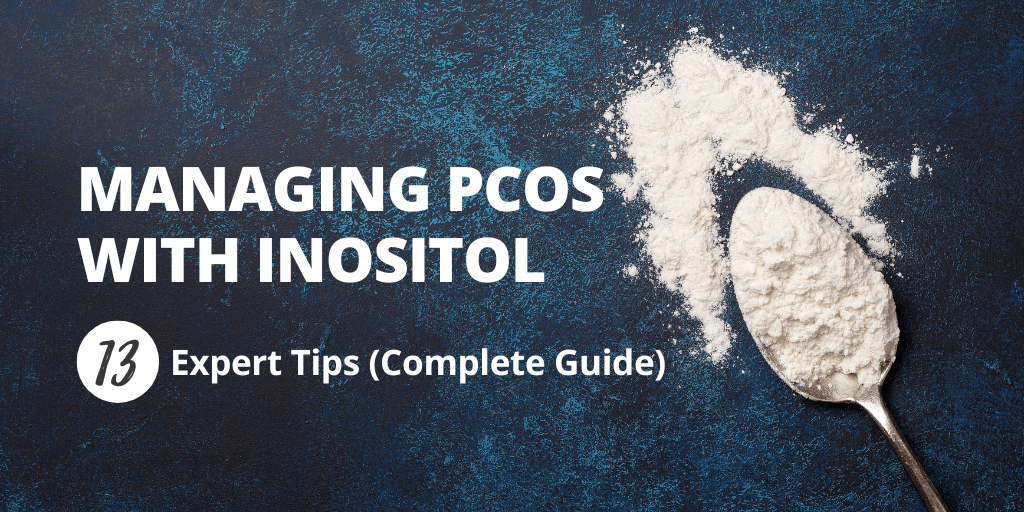[ad_1]
Key Takeaways
Myo-inositol can enhance fertility and reduce pregnancy risks for women with PCOS. It can also help with acne and hirsutism for some people. Weight loss benefits are small at best.
Inositol is a good alternative to Metformin.
In most cases, it’s ill-advised to take D-chiro-inositol in isolation. 40:1 combined inositol formulations are considered superior.
There’s no such thing as a supplement for PCOS, but inositol may be the next best thing. This article tells you what you need to know about these medicines.
For product recommendations and dosages based on your specific health goals, take this PCOS inositol quiz.
What Is Inositol?
Inositols are a family of naturally occurring, vitamin-like compounds found in many foods. They play a vital role in many key aspects of health and fertility.
The first controlled trial of inositols for PCOS was published in 1999 [1]. Since then, there’s been great interest in two particular forms of inositol: myo-inositol, and D-chiro-inositol. Imbalances in these inositols cause insulin resistance in women with PCOS. They may also account for the sex hormone imbalances that characterize this syndrome [2-4].
How Much Inositol for PCOS
Typical inositol PCOS dosage:
- Myo-inositol: 4,000 mg/day taken in two doses.
- D-chiro-inositol: 600 – 1000 mg per day [5, 6].
- Combined Myo and D-chiro inositol: 4000 mg/day of myo-inositol + 100 mg/day of D-chiro inositol taken in two doses.
1. Food is a Good Source of Inositol… But Not for PCOS
Phytic acid is the main source of dietary inositol. Some of the best high-inositol foods for women with PCOS include [7]:
- Grains: Amaranth, buckwheat, wild rice, and popcorn.
- Legumes: Beans, chickpeas, and lentils.
- Nuts: Almonds, cashews, macadamia, walnuts, and pecans.
- Seeds: Flaxseeds, sunflower seeds, and sesame seeds.
I use these ingredients in a lot of my PCOS recipes. Many also feature in my free 30-Day PCOS Diet Challenge and free 3-Day Meal Plan.
Studies show that it’s possible to get enough inositol from diet alone [7, 8]. But these diets are too high in carbohydrates for women with PCOS. Getting the right balance of macronutrients is a fundamental aspect of managing PCOS. That’s why inositol dietary supplements make a lot of sense.
2. It Improves Insulin Sensitivity & Blood Sugar Regulation
Insulin resistance is one of the underlying causes of PCOS [9, 10]. It’s also the primary reason that PCOS is associated with metabolic syndrome and several chronic diseases [11, 12]. Insulin resistance occurs when your cells stop responding properly to insulin. This drives insulin levels up and impacts blood sugar regulation.
Myo-inositol and D-chiro-inositol improve insulin sensitivity [13]. They do this by altering insulin signaling which plays a key role in glucose metabolism. Increased insulin sensitivity allows cells to use insulin more efficiently. This means insulin levels remain within healthier ranges helping to reverse insulin resistance.
Over time, inositol therapy results in better hormone balance for all types of PCOS [5, 6, 14].
3. Myo-Inositol Can Enhance Fertility
Large reviews of the scientific literature show uncertainty that inositol improves fertility [15, 16]. But smaller studies done on PCOS women show promising results. Myo-inositol has been shown to:
- Improve ovarian function [17].
- Increase egg quality [18, 19].
- Increase the yield of mature eggs during IVF [20].
- Increase pregnancy rates during IVF [21, 22].
- Reduce the risk of ovarian hyperstimulation syndrome [19].
- Be more effective than birth control at regulating ovarian function [23].
- Be better than metformin for boosting pregnancy rates [24].
In one study, overweight women with PCOS were given myo-inositol and folic acid during IVF. Pregnancy rates were nearly three times higher compared to women who only received folic acid. [22].
Researchers looking at women undergoing intrauterine insemination (IUI) had similar results. Pregnancy rates were roughly doubled after taking myo-inositol for 3 months [25].
4. Inositol Can Prevent Gestational Diabetes
Gestational diabetes is a common problem within the PCOS community. This is where women who didn’t previously have diabetes, start having high blood sugar levels during pregnancy. Gestational diabetes is a serious condition. It increases the risk of several health complications both for the mother and for the baby.
Studies show that inositol supplements can reduce these risks [26, 27]. It’s often prescribed by physicians for the management of gestational diabetes.
5. Inositol Can Reduce Acne and Hirsutism
Unwanted hair and skin issues cause a lot of distress for women with PCOS [28]. But inositol can sometimes help. This is because inositol lowers androgen levels [4, 13].
Myo-inositol has shown statistically significant (but small) improvements in unwanted hair [29]. One study found that it helped about a third of women with hirsutism. More than half of the women studied also saw significant improvements in PCOS acne [30].
6. Weight Loss Benefits are Small at Best
Despite its impact on insulin, inositol is not a good weight loss supplement. Nordio and Proietti 2012 conducted a famous trial giving women with PCOS inositol supplements. This helped with fertility but made no difference to hip-to-waist ratio or BMI [31]. Other trials have found the weight loss benefits to be small at best [17, 32]. We’re talking about only 1-2 pounds on average over 6 months of supplementation.
That’s a statistically significant amount, but it’s below most people’s expectations.
PCOS weight loss is best achieved using these 15 steps.
7. It’s Better Than Metformin
Metformin for PCOS is a widely used treatment. But side effects are common [33, 34]. Metformin is also known to deplete nutrients with long-term use [35-43].
Metformin has limited use cases for PCOS. For example, the quality of evidence supporting its benefits for fertility is “low” [44]. The Endocrine Society Clinical Practice Guidelines state that it “has limited or no benefit in treating hirsutism, acne, or infertility [45].”
Many meta-analyses now show that inositol supplements are as effective as metformin for a range of biomarkers. These include insulin sensitization, testosterone levels, body mass index, and menstrual frequency [46, 47].
A combined therapy of myo-inositol and d-chiro-inositol shows the most promise for fertility. For example, a 2021 meta-analysis compared inositol supplements to metformin. This study showed that a combined inositol supplement was many times more effective than metformin at improving menstrual frequency [46].
8. D-Chiro-Inositol Has Limited Use in Polycystic Ovary Syndrome
When selecting products, the first decision is what type of inositol you want to take. You have three choices:
- Taking D-chiro-inositol alone.
- Taking Myo-inositol alone.
- Take a combination of myo-inositol and D-chiro-inositol.
Taking D-chiro-inositol alone is best left to women that have a BMI > 30, and who also have close relatives that are diabetic [48]. In most other cases, you’re better off taking myo-inositol.
9. A 40:1 Blended Supplement is Best for PCOS
Taking myo-inositol alone is the cheapest way to supplement inositol. The benefits of myo-inositol alone are well-proven, especially for fertility.
But the best inositol supplement for PCOS contains both myo-inositol and D-chiro-inositol. Studies show that a mixture of 40 parts myo-inositol to 1-part D-chiro-inositol is more effective than other formulations [49]. 40:1 is the physiological ratio that these two inositol isomers are found in the body.
During the 2010s the exact ideal ratio was the subject of debate [50]. But this question now seems to be settled. It’s why I’ve changed my tune when it comes to Ovasitol for PCOS.
The superiority of a 40:1 inositol combined supplement has been demonstrated in mouse models of PCOS [51]. It’s also been proven in PCOS patients seeking to restore ovulation [52]. Increasing the relative amounts of D-chiro inositol above 40:1 appears to reduce effectiveness and may have a negative effect.
Take my PCOS inositol quiz to find out if a 40:1 ratio is best for you.
10. Ovasitol is the Best 40:1 Ratio Brand for PCOS
Ovasitol by Theralogix is the market-leading inositol supplement for women with PCOS. And for good reason. Ovasitol contains myo-inositol and D-chiro-inositol in a 40:1 ratio. As described above, this is the most effective formulation for the treatment of PCOS.
Ovasitol is made to the highest nutraceutical standards and is free from unnecessary ingredients. It’s recommended that you take one individual packet or a scoop of Ovasitol powder twice a day. Each of these doses contains 2000 mg of myo-inositol and 50 mg D-chiro inositol.
11. Buy Only Pure Myo-Inositol Products
If you’re not buying Ovasitol, then it’s best to buy only pure myo-inositol. Jarrow Formulas is a well-priced and reliable brand. Pure Encapsulations also make a top-quality myo-inositol product.
The recommended dosage of myo-inositol is 4000 mg/day taken in two doses. That’s equal to about 1 tsp twice a day.
It’s important to be wary of products that include sweeteners, vitamins, and other ingredients. The addition of these other ingredients amounts to a “marketing maneuver” and may inhibit gut absorption [53].
The addition of folic acid to inositol supplements should be viewed with particular caution. Several recent studies have associated PCOS with MTHFR gene mutations [54, 55]. For these women, taking folic acid during pregnancy can affect childhood lung function [56]. Supplementing with methyl folate, the active form of folate is generally advised for PCOS patients instead of folic acid [57].
This is one of the reasons I prefer Theralogix preconception vitamins.
12. Safety Guidelines for Inositol Supplementation
Myo-inositol is a safe supplement. High doses have been used in trials exploring the potential for inositol supplements to treat panic disorders [58]. Inositol supplements are safe to take during your period and throughout pregnancy. No adverse effects were found in many studies that looked at normal doses taken during pregnancy [59, 60].
D-chiro-inositol alone should be approached more cautiously. High dosages may adversely affect egg quality [61].
Combination products like Ovasitol are safe to take during pregnancy and breastfeeding. There are no expected side effects.
The biggest thing to be aware of when taking inositol is its impact on blood glucose levels. Because they have a similar effect as metformin, people that are taking this drug may need to reduce their dose.
13. How Diet Enhances Inositol Benefits
The benefits of inositol supplementation derive from their ability to improve insulin sensitivity. To get the most out of this intervention though, it’s important to also change how you eat. Especially if weight loss is one of your goals.
On average, 6 months of inositol supplementation results in 1-2 pounds of weight loss [17, 32]. We frequently see weight loss of 5-10 pounds within the short period of my free 30-Day PCOS Diet Challenge. Some past participants have gone on to sustain over 100 pounds of weight loss for many years following this event.
For a sample of the meal plans issued during the Challenge, download this free 3-Day Meal Plan.
In my experience, both personally and as a health coach, no supplement can compete with a PCOS diet for efficacy.
A PCOS diet improves insulin sensitivity by reducing inflammation. You can achieve this by avoiding certain foods like sugar, gluten, and dairy. A PCOS diet also takes a direct approach to insulin regulation through a better balance of macronutrients.
The Bottom Line
Both myo-inositol and D-chiro-inositol can be good for women with PCOS. Especially when combined in a 40:1 ratio. These compounds can correct the hormone imbalances that characterize this syndrome.
Inositol supplements are safe when used as directed. They can improve metabolic health, fertility, skin, and hair. Inositol supplements alter insulin sensitivity. Because of this, they’re most effective when also following a PCOS diet.
For personalized inositol recommendations, click here to take my PCOS inositol quiz.
FAQ
Does inositol cause weight loss with PCOS? Myo-inositol may cause weight loss, but the strength of the effect is small. The most promising trials to date show only 1-2 pounds of weight loss on average over 6 months of supplementation [17, 32].
How do you explain all the inositol PCOS weight loss success stories out there? Any meaningful weight loss achieved after taking inositol supplements is likely to be the result of other factors. This is clear from the randomized controlled trials that have studied this question. Many women will undertake diet and lifestyle changes when supplementing with inositol. These interventions are more likely to drive weight loss than inositol alone.
What’s the difference between Ovasitol and inositol? Inositol is a general name for a family of nutrients. But most people use this term to refer to myo-inositol. Ovasitol is a brand-name inositol supplement. It contains a specific formulation of 40 parts myo-inositol to 1 part D-chiro-inositol.
How long does it take for inositol to work for PCOS? Studies show that the benefits of inositol supplements can be seen within 3 months. But greater benefits are seen after 6 months of treatment [31].
What is the best myo-inositol supplement for fertility? Myo-inositol is a commodity supplement. Most brands should be capable of delivering similar clinical results. But independent studies have observed significant issues with product quality and labeling accuracy [62]. It’s advised to only use trusted suppliers like those mentioned above.
Can I take myo-inositol during my period? Yes. Myo-inositol should be taken daily for the duration of treatment. It is suitable to use during your period.
When is the best time to take inositol for PCOS? Inositol is best taken when making changes to your diet and lifestyle. This helps further improve insulin regulation and hormone balance. The best time of day to take inositol is following the first and last meal of the day. It’s recommended to take inositol in two doses, at least six hours apart.
What are the most common Inositol PCOS side effects? Does inositol cause diarrhea? A 2011 review investigated the safety and side effects of myo-inositol. Only the highest dose of myo-inositol (12 g/day) induced mild gastrointestinal side effects. This included things like nausea, flatus, and diarrhea. The severity of side effects did not increase with the dosage [63]. The rates used for the treatment of PCOS (4 g/day) do not typically cause issues with diarrhea. But some patients experience headaches and dizziness when first starting supplementation.
What are some Ovasitol alternatives? Ovasitol is the market leader in PCOS inositol supplements. Inofolic Combi by LOLI Pharma is a suitable alternative. This product has been used in many inositol trials.
Author
Combining rigorous science and clinical advice with a pragmatic approach to habit change, Kym is on a mission to show women with PCOS how to take back control of their health and fertility. Read more about Kym and her team here.
Co-Authors

This blog post has been critically reviewed to ensure accurate interpretation and presentation of the scientific literature by Dr. Jessica A McCoy, Ph.D. Dr McCoy has a master’s degree in cellular and molecular biology, and a doctorate in reproductive biology and environmental health. She currently serves as a University professor at the College of Charleston, South Carolina.

This blog post has also been medically reviewed and approved by Dr. Sarah Lee, M.D. Dr. Lee is a board-certified Physician practicing with Intermountain Healthcare in Utah. She obtained a Bachelor of Science in Biology from the University of Texas at Austin before earning her Doctor of Medicine from UT Health San Antonio.
References
1Nestler, J.E., et al., Ovulatory and metabolic effects of D-chiro-inositol in the polycystic ovary syndrome. N Engl J Med, 1999. 340(17): p. 1314-20.
2Baillargeon, J.P., et al., Altered D-chiro-inositol urinary clearance in women with polycystic ovary syndrome. Diabetes Care, 2006. 29(2): p. 300-5.
3Unfer, V., et al., Altered Ovarian Inositol Ratios May Account for Pathological Steroidogenesis in PCOS. Int J Mol Sci, 2020. 21(19).
4Dinicola, S., et al., Inositols: From Established Knowledge to Novel Approaches. Int J Mol Sci, 2021. 22(19).
5Iuorno, M.J., et al., Effects of d-chiro-inositol in lean women with the polycystic ovary syndrome. Endocr Pract, 2002. 8(6): p. 417-23.
6Laganà, A.S., L. Barbaro, and A. Pizzo, Evaluation of ovarian function and metabolic factors in women affected by polycystic ovary syndrome after treatment with D-Chiro-Inositol. Arch Gynecol Obstet, 2015. 291(5): p. 1181-6.
7Moroni, R.F., et al., The feasibility of a diet which enhances inositol availability. Progress in Nutrition, 2021. 23(2): p. e2021078.
8Clements, R.S., Jr. and B. Darnell, Myo-inositol content of common foods: development of a high-myo-inositol diet. Am J Clin Nutr, 1980. 33(9): p. 1954-67.
9Marshall, J.C. and A. Dunaif, Should all women with PCOS be treated for insulin resistance? Fertil Steril, 2012. 97(1): p. 18-22.
10Wang, J., et al., Hyperandrogenemia and insulin resistance: The chief culprit of polycystic ovary syndrome. Life Sciences, 2019. 236.
11Daniilidis, A. and K. Dinas, Long term health consequences of polycystic ovarian syndrome: a review analysis. Hippokratia, 2009. 13(2): p. 90-2.
12Chen, W. and Y. Pang, Metabolic Syndrome and PCOS: Pathogenesis and the Role of Metabolites. Metabolites, 2021. 11(12).
13Kamenov, Z. and A. Gateva, Inositols in PCOS. Molecules, 2020. 25(23).
14Unfer, V., et al., Effects of myo-inositol in women with P14OS: a systematic review of randomized controlled trials. Gynecol Endocrinol, 2012. 28(7): p. 509-15.
15Laganà, A.S., et al., Inositol in Polycystic Ovary Syndrome: Restoring Fertility through a Pathophysiology-Based Approach. Trends Endocrinol Metab, 2018. 29(11): p. 768-780.
16Showell, M.G., et al., Inositol for subfertile women with polycystic ovary syndrome. Cochrane Database Syst Rev, 2018. 12(12): p. Cd012378.
17Gerli, S., et al., Randomized, double blind placebo-controlled trial: effects of myo-inositol on ovarian function and metabolic factors in women with PCOS. Eur Rev Med Pharmacol Sci, 2007. 11(5): p. 347-54.
18Ciotta, L., et al., Effects of myo-inositol supplementation on oocyte’s quality in PCOS patients: a double blind trial. Eur Rev Med Pharmacol Sci, 2011. 15(5): p. 509-14.
19Papaleo, E., et al., Myo-inositol may improve oocyte quality in intracytoplasmic sperm injection cycles. A prospective, controlled, randomized trial. Fertil Steril, 2009. 91(5): p. 1750-4.
20Garg, D. and R. Tal, Inositol Treatment and ART Outcomes in Women with PCOS. Int J Endocrinol, 2016. 2016: p. 1979654.
21Zheng, X., et al., Inositol supplement improves clinical pregnancy rate in infertile women undergoing ovulation induction for ICSI or IVF-ET. Medicine (Baltimore), 2017. 96(49): p. e8842.
22Artini, P.G., et al., Endocrine and clinical effects of myo-inositol administration in polycystic ovary syndrome. A randomized study. Gynecol Endocrinol, 2013. 29(4): p. 375-9.
23Ozay, A.C., et al., Different Effects of Myoinositol plus Folic Acid versus Combined Oral Treatment on Androgen Levels in PCOS Women. Int J Endocrinol, 2016. 2016: p. 3206872.
24Raffone, E., P. Rizzo, and V. Benedetto, Insulin sensitiser agents alone and in co-treatment with r-FSH for ovulation induction in PCOS women. Gynecol Endocrinol, 2010. 26(4): p. 275-80.
25Emekçi Özay, Ö., et al., Myo-inositol administration positively effects ovulation induction and intrauterine insemination in patients with polycystic ovary syndrome: a prospective, controlled, randomized trial. Gynecol Endocrinol, 2017. 33(7): p. 524-528.
26Sobota-Grzeszyk, A., M. Kuźmicki, and J. Szamatowicz, Myoinositol in the Prevention of Gestational Diabetes Mellitus: Is It Sensible? J Diabetes Res, 2019. 2019: p. 3915253.
27D’Anna, R., et al., Myo-Inositol for the Prevention of Gestational Diabetes Mellitus. A Brief Review. J Nutr Sci Vitaminol (Tokyo), 2019. 65(Supplement): p. S59-s61.
28Pasch, L., et al., Clinician vs Self-ratings of Hirsutism in Patients With Polycystic Ovarian Syndrome: Associations With Quality of Life and Depression. JAMA Dermatol, 2016. 152(7): p. 783-8.
29Minozzi, M., G. D’Andrea, and V. Unfer, Treatment of hirsutism with myo-inositol: a prospective clinical study. Reprod Biomed Online, 2008. 17(4): p. 579-82.
30Zacchè, M.M., et al., Efficacy of myo-inositol in the treatment of cutaneous disorders in young women with polycystic ovary syndrome. Gynecol Endocrinol, 2009. 25(8): p. 508-13.
31Nordio, M. and E. Proietti, The combined therapy with myo-inositol and D-chiro-inositol reduces the risk of metabolic disease in PCOS overweight patients compared to myo-inositol supplementation alone. Eur Rev Med Pharmacol Sci, 2012. 16(5): p. 575-81.
32Le Donne, M., et al., Effects of three treatment modalities (diet, myoinositol or myoinositol associated with D-chiro-inositol) on clinical and body composition outcomes in women with polycystic ovary syndrome. Eur Rev Med Pharmacol Sci, 2019. 23(5): p. 2293-2301.
33Bouchoucha, M., B. Uzzan, and R. Cohen, Metformin and digestive disorders. Diabetes Metab, 2011. 37(2): p. 90-6.
34Florez, H., et al., Impact of metformin-induced gastrointestinal symptoms on quality of life and adherence in patients with type 2 diabetes. Postgrad Med, 2010. 122(2): p. 112-20.
35Laird, E.J., et al., Voluntary fortification is ineffective to maintain the vitamin B12 and folate status of older Irish adults: evidence from the Irish Longitudinal Study on Ageing (TILDA). Br J Nutr, 2018. 120(1): p. 111-120.
36Aroda, V.R., et al., Long-term Metformin Use and Vitamin B12 Deficiency in the Diabetes Prevention Program Outcomes Study. J Clin Endocrinol Metab, 2016. 101(4): p. 1754-61.
37Ting, R.Z., et al., Risk factors of vitamin B(12) deficiency in patients receiving metformin. Arch Intern Med, 2006. 166(18): p. 1975-9.
38Bauman, W.A., et al., Increased intake of calcium reverses vitamin B12 malabsorption induced by metformin. Diabetes Care, 2000. 23(9): p. 1227-31.
39Kozyraki, R. and O. Cases, Vitamin B12 absorption: mammalian physiology and acquired and inherited disorders. Biochimie, 2013. 95(5): p. 1002-7.
40Wulffelé, M.G., et al., Effects of short-term treatment with metformin on serum concentrations of homocysteine, folate and vitamin B12 in type 2 diabetes mellitus: a randomized, placebo-controlled trial. J Intern Med, 2003. 254(5): p. 455-63.
41Quadros, E.V., Advances in the understanding of cobalamin assimilation and metabolism. Br J Haematol, 2010. 148(2): p. 195-204.
42Reinstatler, L., et al., Association of biochemical B₁₂ deficiency with metformin therapy and vitamin B₁₂ supplements: the National Health and Nutrition Examination Survey, 1999-2006. Diabetes Care, 2012. 35(2): p. 327-33.
43Wakeman, M. and D.T. Archer, Metformin and Micronutrient Status in Type 2 Diabetes: Does Polypharmacy Involving Acid-Suppressing Medications Affect Vitamin B12 Levels? Diabetes Metab Syndr Obes, 2020. 13: p. 2093-2108.
44Morley, L.C., et al., Insulin-sensitising drugs (metformin, rosiglitazone, pioglitazone, D-chiro-inositol) for women with polycystic ovary syndrome, oligo amenorrhoea and subfertility. Cochrane Database Syst Rev, 2017. 11(11): p. Cd003053.
45Legro, R.S., et al., Diagnosis and treatment of polycystic ovary syndrome: an Endocrine Society clinical practice guideline. J Clin Endocrinol Metab, 2013. 98(12): p. 4565-92.
46Zhao, H., et al., Comparative efficacy of oral insulin sensitizers metformin, thiazolidinediones, inositol, and berberine in improving endocrine and metabolic profiles in women with PCOS: a network meta-analysis. Reprod Health, 2021. 18(1): p. 171.
47Facchinetti, F., et al., Short-term effects of metformin and myo-inositol in women with polycystic ovarian syndrome (PCOS): a meta-analysis of randomized clinical trials. Gynecol Endocrinol, 2019. 35(3): p. 198-206.
48Genazzani, A.D., et al., Modulatory role of D-chiro-inositol (DCI) on LH and insulin secretion in obese PCOS patients. Gynecol Endocrinol, 2014. 30(6): p. 438-43.
49Roseff, S. and M. Montenegro, Inositol Treatment for PCOS Should Be Science-Based and Not Arbitrary. Int J Endocrinol, 2020. 2020: p. 6461254.
50Sortino, M.A., et al., Polycystic Ovary Syndrome: Insights into the Therapeutic Approach with Inositols. Front Pharmacol, 2017. 8: p. 341.
51Bevilacqua, A., et al., Myo-inositol and D-chiro-inositol (40:1) reverse histological and functional features of polycystic ovary syndrome in a mouse model. J Cell Physiol, 2019. 234(6): p. 9387-9398.
52Nordio, M., S. Basciani, and E. Camajani, The 40:1 myo-inositol/D-chiro-inositol plasma ratio is able to restore ovulation in PCOS patients: comparison with other ratios. Eur Rev Med Pharmacol Sci, 2019. 23(12): p. 5512-5521.
53Garzon, S., A.S. Laganà, and G. Monastra, Risk of reduced intestinal absorption of myo-inositol caused by D-chiro-inositol or by glucose transporter inhibitors. Expert Opin Drug Metab Toxicol, 2019. 15(9): p. 697-703.
54Li, Y., et al., Significant association between methylenetetrahydrofolate reductase gene C677T polymorphism with polycystic ovary syndrome risk: A meta-analysis update. Medicine (Baltimore), 2020. 99(4): p. e18720.
55Zhu, X.Y., et al., Association of methylenetetrahydrofolate reductase C677T and A1298C polymorphisms with genetic susceptibility to polycystic ovary syndrome: A PRISMA-compliant meta-analysis. Gene, 2019. 719.
56den Dekker, H.T., et al., Maternal folic acid use during pregnancy, methylenetetrahydrofolate reductase gene polymorphism, andchild’s lung function and asthma. Clinical and Experimental Allergy, 2018. 48(2): p. 175-185.
57Serapinas, D., et al., The importance of folate, vitamins B6 and B12 for the lowering of homocysteine concentrations for patients with recurrent pregnancy loss and MTHFR mutations. Reprod Toxicol, 2017. 72: p. 159-163.
58Palatnik, A., et al., Double-blind, controlled, crossover trial of inositol versus fluvoxamine for the treatment of panic disorder. J Clin Psychopharmacol, 2001. 21(3): p. 335-9.
59Regidor, P.A. and A.E. Schindler, Myoinositol as a Safe and Alternative Approach in the Treatment of Infertile PCOS Women: A German Observational Study. Int J Endocrinol, 2016. 2016: p. 9537632.
60D’Anna, R., et al., Myo-inositol may prevent gestational diabetes in PCOS women. Gynecol Endocrinol, 2012. 28(6): p. 440-2.
61Vitagliano, A., et al., “Empiric” inositol supplementation in normal-weight non insulin resistant women with polycystic ovarian disease: from the absence of benefit to the potential adverse effects. Arch Gynecol Obstet, 2015. 291(5): p. 955-7.
62Papaleo, E., et al., Myo-inositol products in polycystic ovary syndrome (PCOS) treatment: quality, labeling accuracy, and cost comparison. Eur Rev Med Pharmacol Sci, 2011. 15(2): p. 165-74.
63Carlomagno, G. and V. Unfer, Inositol safety: clinical evidences. Eur Rev Med Pharmacol Sci, 2011. 15(8): p. 931-6.
Combining rigorous science and clinical advice with a pragmatic approach to habit change, Kym is on a mission to show women with PCOS how to take back control of their health and fertility. Read more about Kym and her team here.
Co-Authors

This blog post has been critically reviewed to ensure accurate interpretation and presentation of the scientific literature by Dr. Jessica A McCoy, Ph.D. Dr McCoy has a master’s degree in cellular and molecular biology, and a doctorate in reproductive biology and environmental health. She currently serves as a University professor at the College of Charleston, South Carolina.

This blog post has also been medically reviewed and approved by Dr. Sarah Lee, M.D. Dr. Lee is a board-certified Physician practicing with Intermountain Healthcare in Utah. She obtained a Bachelor of Science in Biology from the University of Texas at Austin before earning her Doctor of Medicine from UT Health San Antonio.
[ad_2]
Source link




